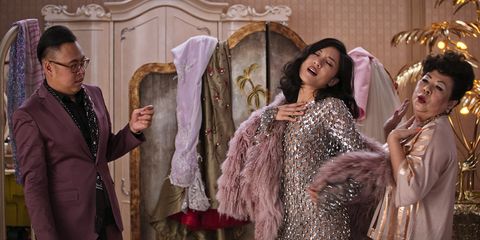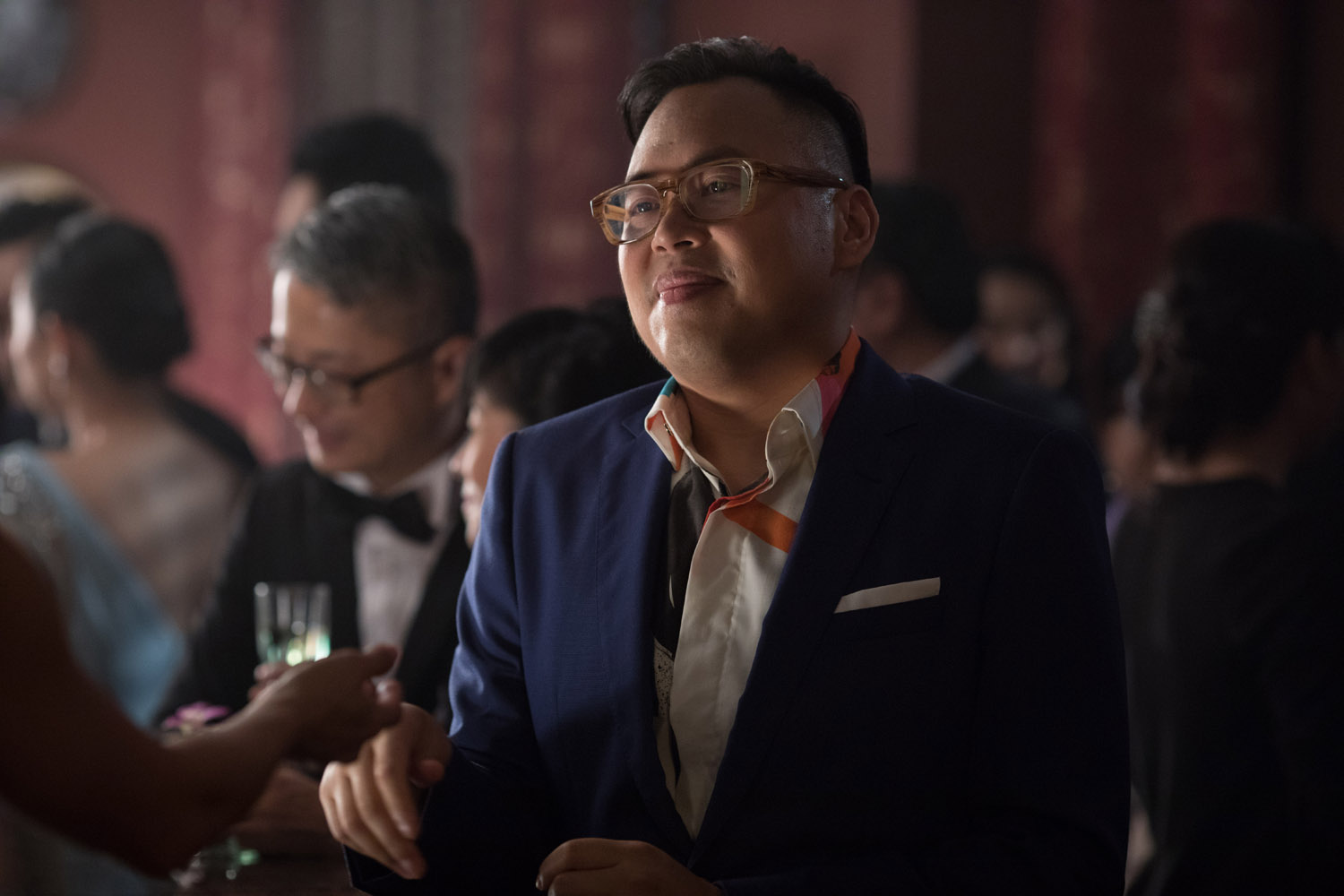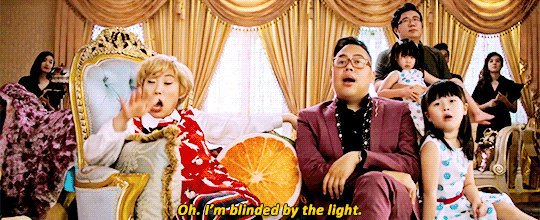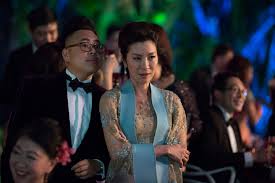a series by Christopher James looking at the 'Gay Best Friend' trope
 Nico Santos does what every gay best friend does in a romantic comedy, stage a makeover montage.After a few retro episodes, we've made it back to modern examples of the Gay Best Friend trope. Crazy Rich Asians employs so many classic romantic comedy moments. When Nick Young (Henry Goulding) asks Rachel Chu (Constance Wu) to meet his family in Singapore, some nearby people overhear and set off a chain of texts that break the news to the entire Young family circle. Bright animated colors pop around the screen to demonstrate word spreading, recalling classic Doris Day title sequences of the 50s and 60s. This pastiche blends well with the grand opulence of the Young’s Singapore compound that feels in line with the worlds of Gentlemen Prefer Blondes and the recent Sex and the City movies.
Nico Santos does what every gay best friend does in a romantic comedy, stage a makeover montage.After a few retro episodes, we've made it back to modern examples of the Gay Best Friend trope. Crazy Rich Asians employs so many classic romantic comedy moments. When Nick Young (Henry Goulding) asks Rachel Chu (Constance Wu) to meet his family in Singapore, some nearby people overhear and set off a chain of texts that break the news to the entire Young family circle. Bright animated colors pop around the screen to demonstrate word spreading, recalling classic Doris Day title sequences of the 50s and 60s. This pastiche blends well with the grand opulence of the Young’s Singapore compound that feels in line with the worlds of Gentlemen Prefer Blondes and the recent Sex and the City movies.
Any love letter to the romantic comedy has to employ one of the character mainstays of the genre: the gay best friend. This comes in the form of Oliver (Nico Santos), the rainbow sheep of the family...
We have a long way to go before we get to Oliver, though. Let’s start with the plot. Rachel Chu (Wu) is an economics professor at NYU who comes from a single mother who fled China. She’s been dating Nick Young for a year, but has never met his family. With his best friend’s wedding approaching, Colin (Chris Pang) and Araminta (Sonoya Mizuno), Nick invites Rachel to come to Singapore and meet his family. Upon embarking on the journey to Singapore, Rachel soon realizes Nick’s family is incredibly wealthy, having basically built Singapore and established a global empire. When Rachel arrives in Singapore, she tries to win the approval of Nick’s mother, Eleanor (Michelle Yeoh), who is exceedingly difficult to please. As she meets more of Nick’s cousins and extended family, Rachel makes some allies and some enemies. Count Oliver as one of her biggest allies in Nick’s family.
 Oliver enters the film 44 minutes into the film when Rachel spills on Nick’s suit at his grandmother’s party. Gay Best Friend to the rescue.
Oliver enters the film 44 minutes into the film when Rachel spills on Nick’s suit at his grandmother’s party. Gay Best Friend to the rescue.
Oliver T'sien: I'm one of the poorer relations. The rainbow sheep of the family. But I make myself useful. Whatever the Youngs want, I procure. Golden koi fish, Huanghuali furniture. A rare Cambodian gong.
The greatest divide between the Old World East and the New School West is the warring ideologies of supporting the family unit versus pursuing one’s dream. Though Oliver acts as Rachel’s gay best friend, he is very much rooted in the ultra-wealthy family structure of the Youngs. We’ve seen many stories about queer people either leaving their families or being shunned by them for being who they are. What we don’t often get is stories of queer people carving out their own niche in the family dynamic. Oliver still believes in being a part of his family and in service to them. So how does he reconcile being gay in a traditional family? He makes his homosexuality an asset that can earn him respect and make him essential.
It’s here we also see Oliver strike up an instant friendship with Rachel’s college best friend, Peik Lin (Awkwafina). While Peik Lin is defined as wild and extroverted (having a cocktail dress and walk of shame dress in her car is clutch), her sexuality is never explicitly defined. The way her and Oliver lock eyes and compliment each other’s fashion, they seem to be talking in code. Even if she isn’t actually queer, Awkwafina makes Peik Lin at the very least queer adjacent, something that Santos picks up on as Oliver. It’s a wonderful, fun moment to clock.
Eleanor doesn’t approve of Rachel because of her class or race. Rachel is a well-educated Chinese woman who has a great job teaching economics. She’s intelligent and genuinely loves Nick, which Eleanor can see. However, as Rachel’s mother warned her before leaving, there’s a difference between Chinese and Chinese-American. Rachel’s ambition stands out as a negative, rather than positive, to Eleanor. She believes that Rachel will always put her wants and needs before Nick and the Young family. This is why she pushes Rachel away. Oliver perfectly embodies the focus on “we” and “the family” that Eleanor wants out of Nick.
 Don't worry, there are many more crazy dresses where that came from. Where was the Costume Design nomination again?
Don't worry, there are many more crazy dresses where that came from. Where was the Costume Design nomination again?
What happens when our heroine, Rachel, is at her lowest? Eleanor has just told her that she will never be enough. She believes it. However, Peik Lin and Oliver are there to tell her that she is enough and that she’ll need to pick herself up and go to Colin and Araminta’s wedding. So begins the time honored tradition of the makeover montage. It’s time to be honest, there’s never been a makeover montage that I haven’t loved. They are pure shots of serotonin. Crazy Rich Asians is no exception. Watching Peik Lina and Oliver try and one up each other on comic insults is a joy (“this is why disco died,” “she’s like a slutty ebola virus”).
Oliver T'sien: It's about time somebody stood up to Auntie Eleanor. But you, not me, oh God. She can't ever know I was here.
Oliver never really completes his arc. He crosses family lines to help Rachel win over the family, despite Eleanor making it clear her distaste for Rachel. Yet, there’s never a moment where Oliver gets to stand up for himself or assert his position. This is likely true to life. Oliver has created a role for himself in the family where can be valuable and respected on his terms. While the straight cousins flaunt their partners, businesses and excess, Oliver provides a service to earn his keep. He doesn’t have the privilege to do whatever he wants and still lay claim to the family’s money. This can be seen in many families, where the gay child hypercompensates to earn love and value.
 Okay, fair. All gay men do flock to Michelle Yeoh's side.
Okay, fair. All gay men do flock to Michelle Yeoh's side.
While at Colin and Araminta’s wedding, Eleanor notices cousin Alistair (Remy Hii) dancing sloppily and suggestively with his actress girlfriend, Kitty (Fiona Xie). She motions to Oliver and asks him to separate them on the dance floor, so as not to embarrass anyone during the wedding. Oliver dutifully goes over and warns Alistair about an overdrawn discretionary account, which sends him running. Oliver takes over dancing with Kitty, warning her that she will never get this grand wedding that she is enjoying. It’s a biting moment, but one that asserts Oliver’s place in the family. He may not be the golden boy that Nick is. Yet, he’s an important gatekeeper that the family trusts and values. It also places him higher on the pecking order than the more irresponsible Alistair.
All of these elements make Oliver such an interesting character and one we hopefully see more of. With a sequel in the works, hopefully we get to see Oliver get a love interest of his own or the chance to headline his own storyline. Nico Santos has been enjoying a great career, including an award winning turn on NBC’s Superstore. This only further underscores the need for more LGBTQ+ stories that don’t just center on white, cis gay men. There are many more stories under the rainbow, and often these gay best friend characters are the stock white stereotype.
It’s very interesting watching Crazy Rich Asians in the midst of the #StopAsianHate movement. The opening scene in particular illustrates how the Western world can be so prejudiced against all members of the Asian community, regardless of their wealth or status. The rest of the film never delves into the racism that the Asian community faces. After all, it’s a film about the intricacies within the Asian community, rather than how the rest of the world views them. Plus, it’s incredibly important to see movies about Asian joy, rather than suffering. Yet, what we’re seeing in 2021 is a country where the APIA (Asian and Pacific Islander American) community, particularly those of lower socioeconomic status, are suffering. We need more action in government to denounce these actions, prosecute the perpetrators and combat racism at every level. What the film industry can do is continue to tell more diverse stories. There is an appetite for them and the more diverse stories we can tell, the more we can hopefully usher in a more tolerant, diverse world.
Previously in Gay Best Friend
pre stonewall
- Plato (Sal Mineo) in Rebel Without a Cause (1955)
- Sebastian Venable in Suddenly Last Summer (1959)
- Calla Mackie (Estelle Parsons) in Rachel Rachel (1968)
post stonewall
- Erich (Norbert Weisser) in Midnight Express (1978)
- Toddy (Robert Preston) & Squash (Alex Karras) in Victor/Victoria (1982)
- Dolly Peliker (Cher) in Silkwood (1983)
1990s and the 2000s
- Sammy Gray (Steve Zahn) in Reality Bites (1994)
- Gareth (Simon Callow) and Matthew (John Hannah) in Four Weddings and a Funeral (1994)
- George Downs (Rupert Everett) in My Best Friend’s Wedding (1997)
- George Hanson (Paul Rudd) in The Object of My Affection (1998)
- Bill Truitt (Martin Donovan) in The Opposite of Sex (1998)
- Robert (Rupert Everett) in The Next Best Thing (2000)
- Patti (Sandra Oh) in Under the Tuscan Sun (2003)
- Nigel (Stanley Tucci) in The Devil Wears Prada (2006)
- Wallace Wells (Kieran Culkin) in Scott Pilgrim vs the World (2010)
the now